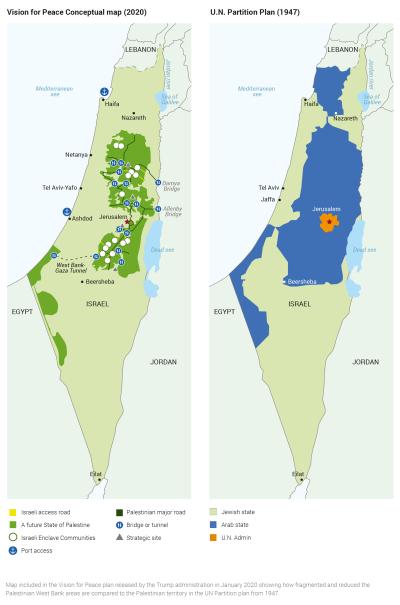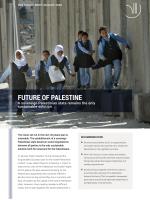Future of Palestine

The vision set out in the new US peace plan is untenable. The establishment of a sovereign Palestinian state based on sound negotiations between all parties is the only sustainable solution both for Israel and for the Palestinians.
■ Denmark should follow the EU in supporting the ‘two-state’ solution and urge the US to include the Palestinians in the negotiation process.
■ With a firm focus on human rights and building strong local communities, Denmark should increase foreign aid policies that support Palestinian civil society empowerment.
■ Denmark should, together with the EU, insist on a reconstruction process of the Palestinian National Authority (PNA) to establish transparent governance and promote legitimate leadership for all Palestinians in the territories.
In January 2020 President Trump introduced the long-awaited US peace plan for the Israeli-Palestinian conflict. It was called ‘Peace to Prosperity: A Vision to Improve the Lives of the Palestinian and Israeli People’. At first glance the plan seemed promising for the Palestinians; apparently, they would be offered a territory twice as big as that they live in currently, with East Jerusalem as the capital of the future Palestinian state. However, closer reading revealed a different reality: the US plan legalises the Israeli settlements in the West Bank and it also approves Israeli annexation of 30% of the West Bank, while the ‘extra’ territory for Palestinians is to be located in the Negev desert. Consequently, most Palestinian territory would be penetrated by Israeli settlements and security infrastructure, including safe roads for Israeli settlers and citizens. The Palestinians would not be allowed to conduct any kind of state sovereignty as all decisions concerning state issues are to require approval by Israel, and Israel is to exclusively control and secure all borders. Thus, the Palestinians would be deprived of any security forces. The plan does not really offer the Palestinians a sovereign state, only some sort of political autonomy under Israeli supervision. Concerning East Jerusalem; the plan offers rural areas, including the village ‘Abu Dis’ situated outside Jerusalem as the future Palestinian capital.
US: UN not relevant in the peace process
By taking this position on the status of Jerusalem as well as the Israeli settlements in the West Bank, the plan is in accordance with Israeli demands. However, it is in contradiction with international law and with principles held by US rivals Russia and China as well as by its allies, including Denmark and the EU. The EU considers settlements illegal and defines Jerusalem according to the UN definition of the city as a ‘divided body’ or ‘corpus separatum’. The US is fully aware of the contradiction between the vision in the plan, and the principles for a solution to the Palestinian conflict as they were interpreted in the ‘Roadmap to Peace’ of 2003 – a plan supported by the international community, including the US up until the Trump administration. The new plan seeks to erase this contradiction by simply declaring more than 700 UN resolutions of the General Assembly and the Security Council irrelevant, thus paving the way for the US to singlehandedly change the principles for a resolution to the conflict. While no one can deny that the UN resolutions have produced no progress on the ground, this nonetheless represents a dramatic, unilateral change of the framework without negotiation with other parties than Israel. This unilateral approach has met severe criticism from both the EU and the UN.
Despite its references to a ‘Palestinian state’ and a ‘realistic two-state solution’, the Trump plan does not offer the Palestinians a state at all. Indeed, many commentators have concluded that it is the culmination of a long process of undermining the basis for a Palestinian state through informal annexation of up to 60% of the West Bank territory by the Israelis, and that this plan is a final farewell to the two-state solution. Indeed, commentators in Israel, the US and Palestinians alike have judged the two-state solution forever dead with reference to the collapse of the Roadmap to Peace only two months after it was initiated at a ceremony in Jordan in 2004 – especially after the continued expansion of Israeli settlements in the West Bank and lack of real peace negotiations.
One state, two states, no state
Instead, many have advocated the so-called ‘one-state’ solution. Israeli Professor Ilan Pappé among others defends the ‘one state with two nations’ in which Israel controls the entire territory between the Jordan river and the Mediterranean in a liberal and democratic state that offers Palestinians the same rights and duties as Jewish citizens. From a liberal perspective in international politics, the ‘one-state’ solution is a legitimate solution but is challenged because in such a state Palestinian citizens would become a majority in the near future, thereby denying Israel its identity as a Jewish state, which is a no go for Israel. In 2018 Israel passed the so-called ‘Nation-State Law’ that aims to place Jewish collective rights above individual rights and freedoms. Instead of creating sustainable peace the ‘one-state’ model would lead to a prolonged conflict of attrition between Jewish and non-Jewish citizens with no security guarantees to either party.
Moreover, this scenario would further complicate the Palestinian refugee problem. This problem is escalating constantly and without a sustainable alternative to a Palestinian state followed by a negotiation process for Palestinian refugees it offers no solution to the refugee problem.
Neither does a ‘no-state’ solution. Finally giving up on a Palestinian state is seen as a breach of the promise made by international society to find a negotiated solution for the millions of stateless Palestinian refugees living in the Gaza Strip, the West Bank, and the refugee camps in Lebanon and Jordan or elsewhere.

Palestinian resilience despite weak leadership
With the expansion of settlements and the human rights violations due to the occupation, Israel is often blamed for the failed peace process, but the Palestinians also bear a substantial responsibility. Indeed, as rightfully stated in a 2016 report from the Middle East Quartet, the fragmentation of Palestinian leadership between Hamas in Gaza and Fatah as the main party in the Palestinian National Authority (PNA) on the West Bank has not provided a reliable partner in peace negotiations. Only a legitimate PNA for the Palestinians in both Gaza and the West Bank will perform as a reliable and responsible partner in peace negotiations.
Only a Palestinian state with a legitimate government and with measures that guarantee the security of Israel offers a sustainable solution to the conflict, which means there is no present alternative to the two-state solution
Squeezed between Israel’s previous refusal of a viable two-state solution, Hamas’ control over the Gaza Strip, and the PNA-controlled West Bank, Palestinians lack decent living conditions and good governance. Despite these problems, small communities in Gaza and the West Bank have managed to look after each other and provide for the poor; the local society in the West Bank city of Hebron in particular stands out as a life-affirming example. More challenging are the living conditions for the Palestinians in Gaza who are, in fact a population of children (more than 40% below the age of 14 and more than 60% below 24). Contaminated drinking water and the absence, due to the Israeli blockade, of the possibility to build small business communities or to reconstruct the many buildings and infrastructure damaged during the wars are just some of the challenges they face. Undeterred by this situation, the Palestinian civil society is resilient and forms a base from which the young generation can build a Palestinian nation, but only with legitimate leadership that focuses on the needs of the society rather than the destructive fight between tribes and factions.
Revive negotiations on the two-state peace process
Thus, only a Palestinian state with a legitimate government and with measures that guarantee the security of Israel offers a sustainable solution to the conflict, which means there is no present alternative to the two-state solution. With approximately 500,000 Israeli settlers living in the West Bank, a Palestinian leadership fragmented by internal conflict and a Gaza approaching humanitarian disaster, the obstacles to a sovereign Palestinian state seem insurmountable. However, serious negotiations between reliable and responsible Palestinian and Israeli representatives could overcome the obstacles or provide alternative solutions.
The Trump plan and the Israeli annexation plan for 30% of the West Bank territories, have sparked a surprisingly vivid discussion and opposition, not only among the Palestinians but also in Israel, the US, and among the most influential and significant Israeli lobby groups in the US. Through its ambassador in the US, United Arab Emirates (UAE) suggested that Israel cancel the annexation plans in exchange for a process leading to diplomatic relations between the two states, which would lift Israel further out of its isolation in the Middle East. A deal between UAE and Israel was announced by the US in August 2020 but, as Israel immediately declared, it puts only a temporary stop on annexation. The Palestinians, who once again were not included in the negotiations, have condemned the UAE move. All parties criticising the annexation plan reject a peace proposal that is not based on a clear negotiation process between the Israelis and the Palestinians and that has no regard for the parameters of the two-state solution. This situation must be exploited to invigorate the two-state peace process with a strong focus on rights and duties for all and on addressing the conflict with negotiated political solutions.
Lars Erslev Andersen, Senior Researcher, DIIS & Yuad Jaradat, MA in International Studies and Palestinian diplomat living in Ramallah with a focus on youth education, human relief and good governance
DIIS Experts


